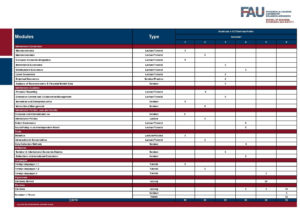General Program Information
The Bachelor’s degree in International Economic Studies (BSc) is a perfect start into a professional career as an economist, whether you aim to work in business, government or academia. The three-year program provides you with all essential knowledge for understanding and analyzing the economy and economic policy. The distinct international perspective of the program reflects the growing importance of international economic integration and emphasizes the comparative study of economic policies. The program consists of core and elective modules in a variety of fields, such as international economics, international business, and international politics, with all courses conducted in English. The international perspective is complemented by a mandatory semester abroad that is integrated into the curriculum.
Current information
- The requirements for application are a higher education entrance certificate equivalent to the German Abitur and sufficient knowledge of the English language (B2, CEFR).
- Please use the DoSV for registration and the Online Application Portal CAMPO to submit your application. Kindly note that applicants are required to hand in paper copies of several documents. Please inform yourself in a timely manner which documents are required and whether you need to provide a certified copy. Please find more detailed information upon entering your application into CAMPO.
- Application portal opens May.
- Deadline for applications is July 15th.
- Kindly note that applications are only possible within the above time frame. The admission committee does not offer pre-screening of application documents and does not accept applications via e-mail or applications outside of the given time frame. We ask you to please respect the admission process.
- Start of the program: October.
Competencies
The program provides a sound understanding of the basic principles of economics, accounting, statistics and quantitative analysis. It enables students to understand and analyze specific problems related to international economics and economic policy. This includes the ability to generate a quantitative assessment using the appropriate statistical and econometric methods as well as fluency in a non-native language. The compulsory stay abroad as well as seminars provide students with important intercultural competencies that are necessary for a successful career in international economics.
Career opportunities
The curriculum provides graduates with the required skills to enter a professional position in a variety of institutions that are concerned with economic decisions and economic policy. Potential employers encompass private corporations, the public sector, but also supranational institutions and non-profit organizations, which are increasingly seeking graduates with a background in international economics and international experience. The program prepares graduates for the possibility of an interesting employment with banks and consultancy companies.
Target group
The program is designed for high-school graduates interested in economics with an international perspective who are looking for a solid foundation for a professional career in business, government, or international agencies. The program also prepares students to pursue graduate studies in economics, business, or public administration. In order to apply, you need a higher education entrance qualification. This is typically a qualified secondary school diploma, though sufficient professional qualification may serve as a substitute depending on approval by the university. The degree program is taught in English throughout. Therefore, good knowledge of the English language is an essential prerequisite to successfully complete the degree program.
Course of study
The program provides students with a comprehensive understanding of economic issues related to international economic integration. Students acquire the skillset to succeed in an international environment in business, government or academia. Particular attention is given to the growing importance of international economic integration and to a comparative approach in the study of economic policies.
The program usually takes six semesters and teaching is conducted in English.
Compulsory courses
The compulsory component of the program includes three subject areas
- International Economics (40ECTS) provides an introduction to basic economic models and methods, as well as key concepts in international economics and economic policy.
- International Business (20 ECTS) provides the basics of business administration with respect to an international context.
- International Politics, Law, and Society (20 ECTS) extends the perspective to include a view on institutions relevant for addressing international issues.
The subject-specific perspective is supplemented by the cross-cutting core area Tools (15 ECTS) dedicated to statistics and data analysis, which provides the essentials for quantitative analysis.
The core area Reflection (10 ECTS) broadens the perspective to practical aspects in the current international business environment, and enables students to apply acquired knowledge to current topics in international economics. From an academic perspective, students learn how to contribute to debates through their own papers and presentations, but also by responding to the work of their peers.
Detailed information regarding individual courses can be researched in the download section, where you can find the module handbook and the study plan/curriculum.
Elective courses
-
- Electives (25 ECTS): This comprises 5 courses of 5 ECTS each that can be freely chosen from a variety of courses concerning topics in international economic studies, international business and international politics. Detailed information regarding the specific courses can be found in the module handbook and the study plan.
- Languages (15 ECTS): Each student must acquire fluency in a chosen language, e.g. English, French, Spanish, Italian, Portuguese and Chinese. German can also count towards this requirement for non-native speakers.
- Study Abroad (20 ECTS).
Bachelor thesis
The final Bachelor thesis (15 ECTS) is based on independent work on a given problem in a chosen subject area. In the bachelor’s thesis seminar students discuss their own and other contributions to subject-related research.
Study abroad
Studying abroad enables students to obtain first-hand experience living outside their own culture and gain insights how economic issues are viewed and discussed in another country and another university. Students can choose among partner universities around the world.
More information about studying abroad is available on the International Office’s website (English).
